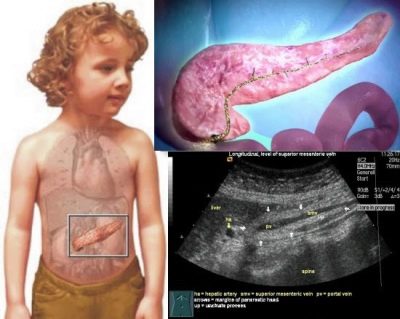What if the pancreas is enlarged in a child?
Diseases of the pancreas occur in children with the development of quite unfavorable symptoms. In some cases, they can be very dangerous and lead to serious complications. This article will tell parents about what they should do if their child has an enlarged pancreas.
The reasons
The digestive system in a child still functions completely differently from adults. The development of pathological disorders in childhood can lead a variety of reasons. These factors, affecting the pancreas, contribute to the development of its diffuse increase. Doctors call such a pathological condition pancreatitis or inflammation of the pancreas.
This body is unique. It not only relates to the digestive system, but also performs a number of endocrinological functions. The pancreas is involved in metabolism and maintains normal blood glucose levels. Violations in her work can lead to the fact that the child will have diabetes.
This pathological condition is characterized by elevated blood levels of sugar.
Normally, a healthy pancreas consists of three large sections - the head, body and tail. Each of these anatomical structures performs strictly defined functions. Without the pancreas, full digestion is impossible. This organ releases a huge amount of digestive enzymes into the blood in response to ingestion of food. This action contributes to the commission of digestion.
A variety of reasons can lead to the development of reactive inflammation in this organ:
Eating Disorder. Abuse of fatty and fried foods is a frequent trigger for the development of inflammation in pancreatic tissue. Such impaired nutrition contributes to the fact that the body is forced to secrete a sufficiently large number of enzymes over a rather long period of time. This condition leads to depletion of the enzyme activity of the pancreas, which is manifested by an increase in its size.
Lactose deficiency. This pathological condition is most acute in infants. This pathology arises in the child even in the period of intrauterine development. This condition is characterized by the immunity of the child's body to any food containing cow's milk.
Abdominal bruises. Mechanical damage contributes to organ damage, which further leads to an increase in size due to severe traumatic edema and inflammation.
Congenital diseases. Anatomical defects in the structure of pancreatic tissue are accompanied by various disorders in the organ. These pathologies are more often recorded in premature babies. The first adverse symptoms begin to appear, as a rule, in children under the age of 1 year.
The presence of mechanical obstacles to the outflow of bile along the biliary tract. In most cases, this state in babies is caused by various stones or parasites that live in the bile ducts. The peak of the disease occurs at the age of 9-14 years.
Chronic pathology organs of the gastrointestinal tract. Diseases of the stomach and intestines, leading to indigestion, also contribute to disorders in the pancreas.This combined development of pathologies can manifest itself in a child with the development of many dyspeptic symptoms.
Long-term medication. Some remedies used to treat epilepsy and other neurological disorders may contribute to the development of pancreatic tissue damage in a child.
Disturbance in calcium metabolism. Increasing this element in the child’s body is often associated with impaired vitamin D production. Overdosing of this substance can also trigger the development of reactive inflammation of the pancreas in a child.
Symptoms
Inflammation in the pancreas that has developed in it as a result of exposure to any causes leads to the appearance of a variety of clinical symptoms in the baby. Most of them are associated with impaired digestion. So, a child with an enlarged and inflamed pancreas may have abdominal pain. Usually it increases after 40-60 minutes from the time of eating.
It is important to note that the pain syndrome increases significantly if the child has eaten fatty or fried foods.
Impaired stool - also a frequent symptom that appears in a child with an enlarged pancreas. In this case, the baby is more concerned about diarrhea. The development of this symptom leads to functional disorders in the pancreas. Insufficient intake of digestive enzymes into the blood contributes to the fact that the food eaten by the child is not fully absorbed. This is manifested by diarrhea.
Children suffering from chronic pancreatitis, often lose weight. Usually this symptom is well manifested in young children. Such children can lag behind their peers in terms of physical development. Weight loss with severe disease can be quite substantial. The appetite of the child while, as a rule, is fully preserved.
Where to go?
To establish the diagnosis, doctors must perform several tests. The most basic examination is abdominal palpation. This study is conducted by a pediatrician during a consultation. Such a simple examination allows the doctor to identify how much the child has an enlarged pancreas.
To establish the degree of functional impairment necessarily held biochemical blood examination. An amylase level is assessed. This specific marker allows doctors to evaluate how severely the pancreatic tissue is damaged, and also to establish the severity of the disease. An increase in blood amylase is a characteristic symptom of pancreatitis.
To determine the increase in the pancreas can also be using modern research. These include Ultrasound, computed and magnetic resonance imaging. These studies have high resolution and can detect almost any anatomical defects.
Even the youngest children can use such methods, as they do not bring any discomfort and pain to the child.
Treatment
After the diagnosis, the baby is prescribed therapy. The treatment of children suffering from diseases of the pancreas, mainly engaged in children's gastroenterologists. Pediatricians can also treat such pathological conditions.
A prerequisite for treatment is dieting. It excludes the use of fatty, fried and spicy foods. Such medical nutrition is prescribed, as a rule, for children for life. Any errors in the diet can lead to a significant deterioration in the general condition and well-being of the child.
The basis of the daily diet of babies with various pathologies of the pancreas are protein and cereal products. When choosing dishes should be preferred low-fat.As products containing protein, you can use turkey, chicken, veal, sea and river fish, seafood, as well as fresh dairy products. You can complement them with any side dishes made from cereals and vegetables.
Butter in the diet of babies with inflammation of the pancreas, should be significantly limited.
It is necessary to supplement dishes with this product very carefully. It is better to replace it with a vegetable. Use in the diet of a child suffering from lactase deficiency such a product should not be.
If the child has an intolerance to dairy products made from cow's milk, they should be completely excluded from the daily diet. An excellent alternative in this case are foods made from goat protein. They can be included in the diet of babies from an early age. The child should enter these products carefully, observing his general condition and stool.
In order to improve the baby's digestion and the work of his pancreas, Be sure to follow the diet. Eat a child should be strictly at the same time. For the normal functioning of the body, it should receive 5-6 meals per day. “Dry” snacks are completely excluded. A snack is better than unsweetened fruit or dairy products.
If the pathology of the pancreas is accompanied by a violation of enzyme activity, then in this case, various drugs are prescribed. They are appointed, as a rule, on rather long reception. To such enzyme products relate "Mezim", "Creon», «Festal» and many others. It is necessary to use these preparations together with meals, washing down with enough liquid.
Only the attending physician prescribes such drugs, as they may have a number of contraindications to use.
In some cases, to eliminate adverse symptoms is held surgery. In most cases, it is used in toddlers with any anatomical defects in the structure of the pancreas. Also, surgeries are shown to eliminate comorbidities that lead to functional disorders of the digestive system. Decides on the need for such treatment pediatric abdominal surgeon.
About what is dangerous inflammation of the pancreas, see the following video.




























